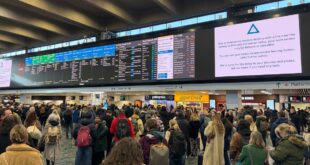Hundreds of thousands of workers in the UK are coming into struggle against the savage offensive on their jobs, wages and working conditions being mounted by the government and the employers.
Wednesday is the second day in less than a week that Royal Mail workers and university workers have struck together, this time alongside 4,000 sixth form lecturers. This is just under 190,000 workers. Strikes involving rail and health workers are set to continue throughout December.
A two-day strike Thursday and Friday last week by 115,000 postal workers, 70,000 university staff and 50,000 Scottish teachers—just under a quarter of a million—was the largest combined walkout since the current wave of strikes began a summer of discontent that has now stretched into winter. Last week also saw a fifth strike by 21,000 members of the ASLEF train drivers’ union.
By year’s end, two strikes on December 15 and 20 are scheduled in the National Health Service (NHS), involving up to 300,000 members of the Royal College of Nursing, as well as eight days of strike action by 40,000 members of the Rail, Maritime and Transport union (RMT). If not blocked, there is the potential for action by hundreds of thousands more NHS workers organised in Unison and the GMB, as well as 30,000 members of the Royal College of Midwives, 15,000 ambulance workers in the GMB, 45,000 junior doctors in the British Medical Association in England and 60,000 physiotherapists.
The strike wave is fuelled by rampant inflation slashing real-terms wage packets after years of stagnant pay, amid a global economic crisis made worse by the impact of the pandemic and NATO’s war against Russia in Ukraine. It demonstrates the determination of millions of workers to fight back against the employers and a Conservative government funnelling money to the major corporations, the super-rich and Britain’s military machine.
This is only one expression of an explosive outbreak of the class struggle internationally driven by the worst cost-of-living crisis in generations—including public sector workers in Portugal, oil refinery workers in France and the Netherlands, rail workers in Austria, and rail and university workers in the US. On December 2, a 24-hour general strike against austerity in Italy will involve workers in the public and private sectors, hitting public transport, schools, health services, logistics and rubbish collection. Rail workers in Belgium are to strike over several days this week.
But in every country the working class confronts a trade union apparatus of well-heeled bureaucrats dedicated to the suppression of the class struggle on behalf of the corporations and the state.
Time and again workers have been brought into head-on conflict with a union bureaucracy intent on sabotaging their struggles and a Labour Party working in a de facto alliance with the Tories. Even as strikes have been called, they have been limited to a stated aim of pressurising the government to either agree to invariably still well below-inflation pay deals, or to “step aside” and allow the employers to do so.
In return, the unions offer to implement attacks including mass redundancies and speed-ups, citing their long record of corporatist collaboration that has been interrupted by the refusal of their members to back down.
The RMT, whose members have waged a struggle throughout the summer and autumn, is a prime example. General Secretary Mick Lynch is promoted as the most militant trade union leader, but in his talks with Network Rail and the train operating companies he is negotiating a possible one percentage point increase on a pay offer of 4 percent this year and 4 percent next year, plus £500. The deal includes the RMT agreeing to cuts and thousands of job losses, stipulating only that redundancies are voluntary.
This would likely closely parallel the deals agreed already at ScotRail—just 5 percent for one year, plus £750, accepting new technology and cuts—and at Transport for Wales of 4.5 percent, increasing to 6.6 percent with “productivity elements”. Lynch has also been in discussions with Transport Secretary Mark Harper after which he described the meeting as “productive” and declared that the government has “got rid of the bellicose monsters that we used to have.
The Communication Workers Union (CWU) has just agreed a below-inflation award at BT that led chief executive Philip Jansen to hail the union as “vital partners” in “our transformation plans and the delivery of the £3 billion cost savings.”
CWU General Secretary Dave Ward has already said he would agree to a 9 percent offer at Royal Mail that also accepts “reasonable change.”
The Tory government, relying on the trade union bureaucracy, is using the demobilisation of mass opposition to prepare a ruthless state offensive, based on minimum service legislation backed up by £1 million fines that will effectively outlaw strike action. The Times has also reported plans to use armed forces personnel to break strikes in the NHS using the Military Aid to Civil Authorities protocol as they did during the 1989-90 ambulance strike. This can be rolled out more broadly against striking workers, with a government minister stating that, as disruption mounts over the winter, “a lot of people… will get fed up with it.”
Politically, the trade unions work with the Labour Party to promote the lie that until a government led by Sir Keir Starmer can be elected as an alternative little more can be done. But a Starmer government would only represent a change of faces at the top and would continue Tory policies of war against workers at home and an escalation of NATO’s war against Russia.
This month he told the Confederation of British Industry that his “party of NATO” was “ready for partnership” to boost productivity and profits and to impose austerity on workers to “reduce debt as a share of our economy”. He would do so by forming an Industrial Strategy Council based on “a real partnership between government, business and unions.”
Workers must answer this political conspiracy to promote austerity, militarism and war.
The fundamental task facing workers is to seize control of their fate from the trade union apparatus. Rank-and-file committees, democratically elected, must be formed in every workplace, dedicated to unifying the growing wave of struggles based on the demand for a general strike to bring down the Tories. This must be waged as a global offensive of the working class through the building of the International Workers Alliance of Rank-and-File Committees (IWA-RFC).
But bringing down the Tories poses the question of what to replace them with when Labour offers no alternative. Any struggle against the Tories must therefore also be a struggle against Labour. That must begin now.
The Socialist Equality Party calls on workers to demand an immediate general election, one held not after the trade union bureaucracy has betrayed and dissipated the mass opposition in the working class, but under conditions where the class struggle is reaching new and explosive dimensions.
In any general election, the SEP will stand candidates and fight to politically organise the working class against austerity, for the elimination of COVID-19 and for an end to war. We will do so in opposition to all those seeking to tie the working class to Labour—the trade union bureaucracy, the pseudo-left and Stalinist groups, and Jeremy Corbyn and the Labour “left”.
We call on workers who agree with this programme to contact the SEP today.
Source link



